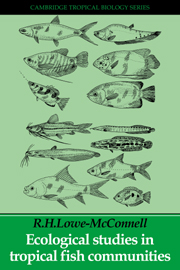Book contents
- Frontmatter
- Contents
- Preface
- Acknowledgements
- PART I INTRODUCTION
- PART II FRESHWATER STUDIES
- 2 The African fish fauna
- 3 Man-made lakes
- 4 Lacustrine fish communities in the Great Lakes of eastern Africa
- 5 Speciation: the African Great Lakes as laboratories of evolution
- 6 The Neotropical fish fauna
- 7 Far Eastern freshwater fish faunas and their distributions
- PART III MARINE FISH STUDIES
- PART IV SYNTHESES
- Appendix: Fish families in tropical waters
- References
- Index
5 - Speciation: the African Great Lakes as laboratories of evolution
Published online by Cambridge University Press: 07 May 2010
- Frontmatter
- Contents
- Preface
- Acknowledgements
- PART I INTRODUCTION
- PART II FRESHWATER STUDIES
- 2 The African fish fauna
- 3 Man-made lakes
- 4 Lacustrine fish communities in the Great Lakes of eastern Africa
- 5 Speciation: the African Great Lakes as laboratories of evolution
- 6 The Neotropical fish fauna
- 7 Far Eastern freshwater fish faunas and their distributions
- PART III MARINE FISH STUDIES
- PART IV SYNTHESES
- Appendix: Fish families in tropical waters
- References
- Index
Summary
The high endemism in the African Great Lakes makes it clear that many fish populations respond to the lacustrine conditions in such a way as to become recognizable as distinct species, or even distinct genera. A species is generally taken to be a group of interbreeding natural populations which is reproductively isolated from other such groups. Generic distinctions rely more on the degree of difference as interpreted by various taxonomists. Within these lakes morphological differences within the family Cichlidae far exceed those between whole families of fishes in the sea. These lakes provide some of the best natural laboratories in which to study the ecological and behavioural changes accompanying the evolution of new species. A great deal has been written about speciation in these cichlids, much of it speculative, some of it controversial; see, for example, papers prepared for a recent symposium on the evolution of fish species flocks (Echelle & Kornfield, 1984). Earlier reviews by Fryer & lies (1972) and Greenwood (1974, 1981) provided detailed analyses.
Controversies aroused include the following: (1) Can changes in habits and behaviour, engendered by changed ecological conditions, lead to speciation (as man-made lake studies seem to suggest and as Fryer (1977) held), or do genetically induced mutations, generally accompanied by slight morphological changes, generally occur first on which selection can than act (as held by Liem (1974) and Liem & Osse (1975))?
- Type
- Chapter
- Information
- Ecological Studies in Tropical Fish Communities , pp. 108 - 117Publisher: Cambridge University PressPrint publication year: 1987

